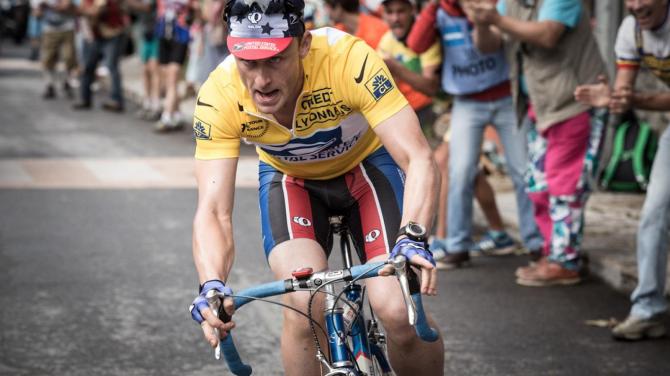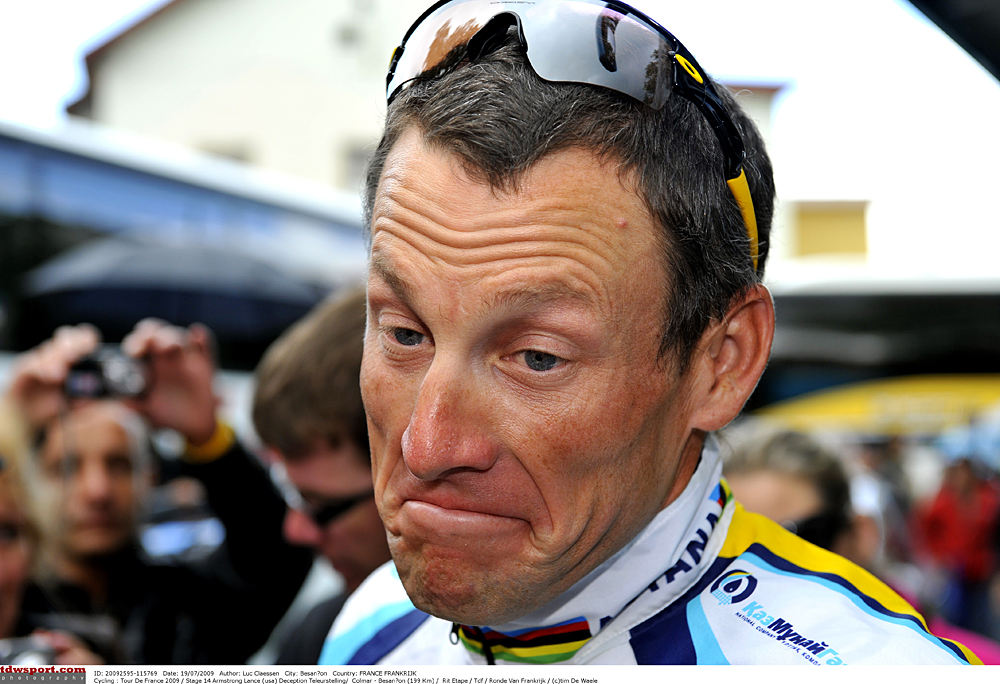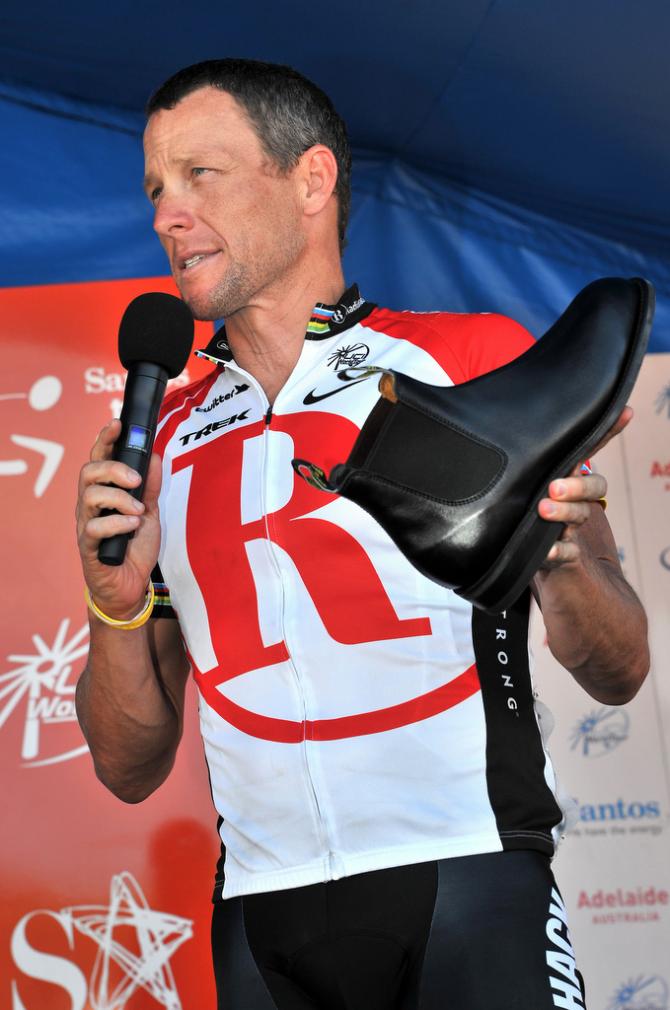Ballester cries foul over Armstrong biopic 'The Program'
Frenchmen objects to film's depiction of Walsh as sole foil; Reviews mixed





The Lance Armstrong biopic "The Program" premiered last week at the Toronto International Film Festival to mixed reviews, with some critics praising lead actor Ben Foster’s portrayal of the disgraced former Tour de France winner while others said director Stephen Frears' fictional treatment does not add anything new to the story.
"'The Program' reps an unpredictable commercial endurance test of public fascination," writes critic Guy Lodge in his review of the movie for Variety.
The film also stirred its own drama within the drama, as Pierre Ballaster, who wrote LA Confidential with Irish Sunday Times journalist David Walsh, one of the film's protagonists, claims he was left out of the story altogether in favour of making Walsh the sole foil for Armstrong's big lie. He also alleges he received no compensation from the film, which claims to be based on Walsh's book Seven Deadly Sins.
"They can censor as they see fit and make the journalist David against the world, but they cannot disguise or misrepresent the facts: we were two, 50-50, in writing," the French journalist recently told LeMonde. "It's an eight-year partnership trampled."
Ballester and publisher La Martiniere have hired an attorney to represent them in the matter. Thibault de Montbrial sent a letter to Studio Canal, the French producer and distributor of Stephen Frears film, but has yet to receive a response, according to LeMonde.
"Pierre Ballester is the victim of a form of historical revisionism that recalls the days when the Politburo was disappearing pictures of opponents to the Soviet regime," de Montbrial told the LeMonde.
Ballester claims Walsh called him and asked him to sign away his rights to the story, especially incidents the pair wrote about in L.A. Confidentiel: Les secrets de Lance Armstrong in 2004 and L.A. Officiel in 2006, but the French journalist declined. Ballester told LeMonde he didn't hear from Walsh again.
The latest race content, interviews, features, reviews and expert buying guides, direct to your inbox!
De Montbrial said he expects a "swift and constructive" response to his letter. "…if not I will take all appropriate legal action," he said.
Likewise, former pro Christophe Bassons, who famously crossed Armstrong and cycling's omerta in his own newspaper column – then paid the price – said he was contacted by the film studio and asked to sign over the rights to his story. Basson said after he declined, the studio did not contact him again.
"I received a contract all in English asking me to assign rights over my life for a dollar," Bassons told LeMonde. "I replied via my lawyer that it was out of question. Since then I have had no news."
Mixed reviews after Toronto premiere
Proper credit and legal rights aside, the film’s merits as entertainment depend on whom you ask. Below are a few snippets of critical takes on the movie:
"...It's fluid and nippy telling of a tale that still seems strangely urgent. …Frears finally decides to be merciless about his subject, happy to allow the audience to abandon sympathy.
"Where his film excels is in examining how it feels to be unable to accept defeat, even when you know victory was ill-gained, and in pulling no punches in pointing the finger at us, the gullible public, dumbly unable to reject an irresistible narrative.
- Catherine Shoard, The Guardian
"'The Program' frames its narrative as something akin to a criminal chase, with Walsh, an early skeptic regarding Armstrong’s winning prowess - as the dogged investigator and audience proxy, and Armstrong as his elusive quarry.
"Like a number of promising frictional elements, however, his story is curtailed in a disappointingly rushed, perfunctory conclusion, which checks off the headline-making stages of Armstrong’s unravelling with scarcely an allusion to the personal consequences or wider fallout.
"Rare is the prestige biopic that feels altogether too short, but after 102 soundly paced minutes, 'The Program' retires with half a hill left to climb."
- Guy Lodge, Variety
"Foster, 34, is less believable as a 21-year-old rising star, but grows into his role, especially after his body transforms following the cancer. A character actor best known for The Messenger and Rampart, he lacks the charisma necessary for the role. He plays Armstrong as the stern bully, which the testimony of his teammates highlight that he was. But he is a more complicated personality, and in the scenes where Armstrong is creating Livestrong, his cancer charity, there is none of the charm that the cyclist showed for the cameras."
- Kaleem Aftab, The Independent
"With practically zero biographical insight into the man behind the cyclist, this Lance Armstrong feels barely three-dimensional, which is strange considering he's a real person. Blame it on a film that ticks the necessary boxes with the same perfunctory acumen a warehouse employee has while going through an inventory list.
"Those who have followed Armstrong's career and recall the media frenzy over his record-breaking achievements, perhaps even had one of those Livestrong bracelets before finding out what a liar he was, will be able to summarize 'The Program' in one, three-lettered, word. 'Yup'."
- Nikola Grozdanovic, The Playlist
"Instead of showing the real commercials Armstrong shot for the many companies that sponsored him, Frears creates a montage of fake advertisements to score some cheap laughs, for instance when Armstrong spits out a bad-tasting energy drink the moment a take is finished.
"The broadness of that gag encapsulates everything that's wrong with this film. It's so preoccupied with hammering home the point that Armstrong was a liar and a cheat, it can't risk giving him any credit for having charisma to spare, or at least enough cunning to know how to manipulate our current fantasies about heroic sportsmen."
- Leslie Felperin, The Hollywood Reporter
"...As a series of clipreel opportunities for Ben Foster to get his Lance Armstrong on, the film exerts a jolting fascination, without giving us nearly enough beef around that: it has half an eye on investigative sports journalism, half on doping procedure, and only summons vague eddies of interest in either.
"You sense structural uncertainty about what the Armstrong saga connotes and how exactly it was begging to be told. But you can't take your eyes off Foster. Whatever he mainlined to enhance this demon visitation of a performance - taking EPOs themselves helped his research - biopics need to bottle it."
-Tim Robey, The Telegraph
Watch the first trailer for the movie below.
